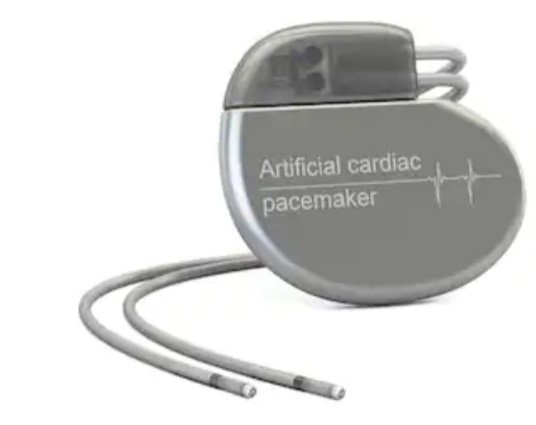A pacemaker is a small device that you place in the chest or abdomen that helps control abnormal heart rhythms. This device uses electrical pulses to prompt the heart to beat at a normal rate. Doctors use pacemakers to treat arrhythmias. Arrhythmias are problems with the rate or rhythm of the heartbeat.
Pacemakers are implanted to help control your heartbeat. They can be implanted temporarily to treat a slow heartbeat after a heart attack, surgery or medication overdose. Or they can be implanted permanently to correct a slow or irregular heartbeat or, in the case of treating heart failure. Installing a pacemaker has proven to increase the life expectancy of a person.
A pacemaker helps monitor and control your heartbeat. The electrodes detect your heart’s electrical activity and send data through the wires to the computer in the generator. If your heart rhythm is abnormal, the computer will direct the generator to send electrical pulses to your heart.
Most pacemaker surgery is done under local anesthesia meaning that you are awake during the procedure, but the area where the pacemaker is implanted is numbed so you will not feel anything. The procedure usually takes between one and two hours.
The pacemakers Battery
Just like any battery, a pacemaker’s battery will run out over time. Since the battery is permanently sealed inside the pacemaker, you cannot replace it when it is low. If your battery is too low, you will need a new pacemaker. How long your battery will last depends on the settings your doctor programs and how much therapy you receive.
Your pacemaker will regularly check its own battery. Your doctor will also check it during your regular follow-up visits.
A pacemaker battery usually lasts 7 to 8 years. When the battery runs down, a new pacemaker will be implanted.
You can check pacemakers over the telephone. This process is transtelephonic monitoring.
Pacemakers are checked with a device called a programmer. When the programmer is held over the pacemaker, it is able to get information about how the pacemaker is working. You can also use it to change the control of the pacemaker.
BENEFITS
By keeping your heart from beating too slowly, pacemakers can treat symptoms like;
- Fatigue
- Light-headedness
- Fainting
Your pacemaker can allow you to get back to a more active lifestyle by automatically adjusting your heart rate to match your level of activity.
About 600,000 pacemakers are implanted to treat people with bradycardia each year. About 3 million people worldwide are living with a pacemaker.
Bradycardia is an abnormally slow heartbeat, typically fewer than 60 beats per minute. Since the chambers of your heart don’t contract often enough to supply enough blood, your body doesn’t get enough oxygen supply and nutrients to function properly. As a result, you may feel tired or dizzy, have shortness of breath, or having fainting spells.
Pacemaker Risks
It is important to know the risks associated with all pacemakers although complications don’t happen very often. They include;
- Bleeding
- Formation of a blood clot
- Damage to adjacent structures (tendons, muscles, nerves)
- Puncture of a lung or vein
- Damage to the heart (perforation or tissue damage)
- Dangerous arrhythmias
- Heart attack
- Stroke
- Death
Even with such risks there comes a time when installing the pacemaker is the only option for saving one’s life. Digital health has greatly grown at improving human lives and even though they can never be 100% sure at saving a life 90% of survival is usually better than nothing.
Everyday life is a risk that we are willing to take, no one is sure about what the next hour holds for them and there it is important to have all the information before embarking on any kind of journey.
The American Heart Association (AHA) advises that if you have a pacemaker, you should be aware of your surroundings and of any devices that may interfere with it.
Below is a list of devices that will not affect or damage pacemakers.
- CB radios
- Electric drills, blankets, and shavers
- Metal detectors
- TV remote controls and transmitters
- Microwave ovens
- X-ray machines
- Airport security detectors
The following devices will affect the pacemaker and it may not work properly if you come in contact with them;
- Power-generation equipment
- Magnetic resonance imaging (MRI)machines
- Radiation machine for treating cancer
- Heavy equipment or motor that has powerful magnets.
Doctors and patients are willing to take risks every single day and fight for their lives instead of giving up. It is therefore important to educate the public on everything pertaining to their health so that they can be ready and aware of what to expect.
“INFORMATION IS POWER!!”


